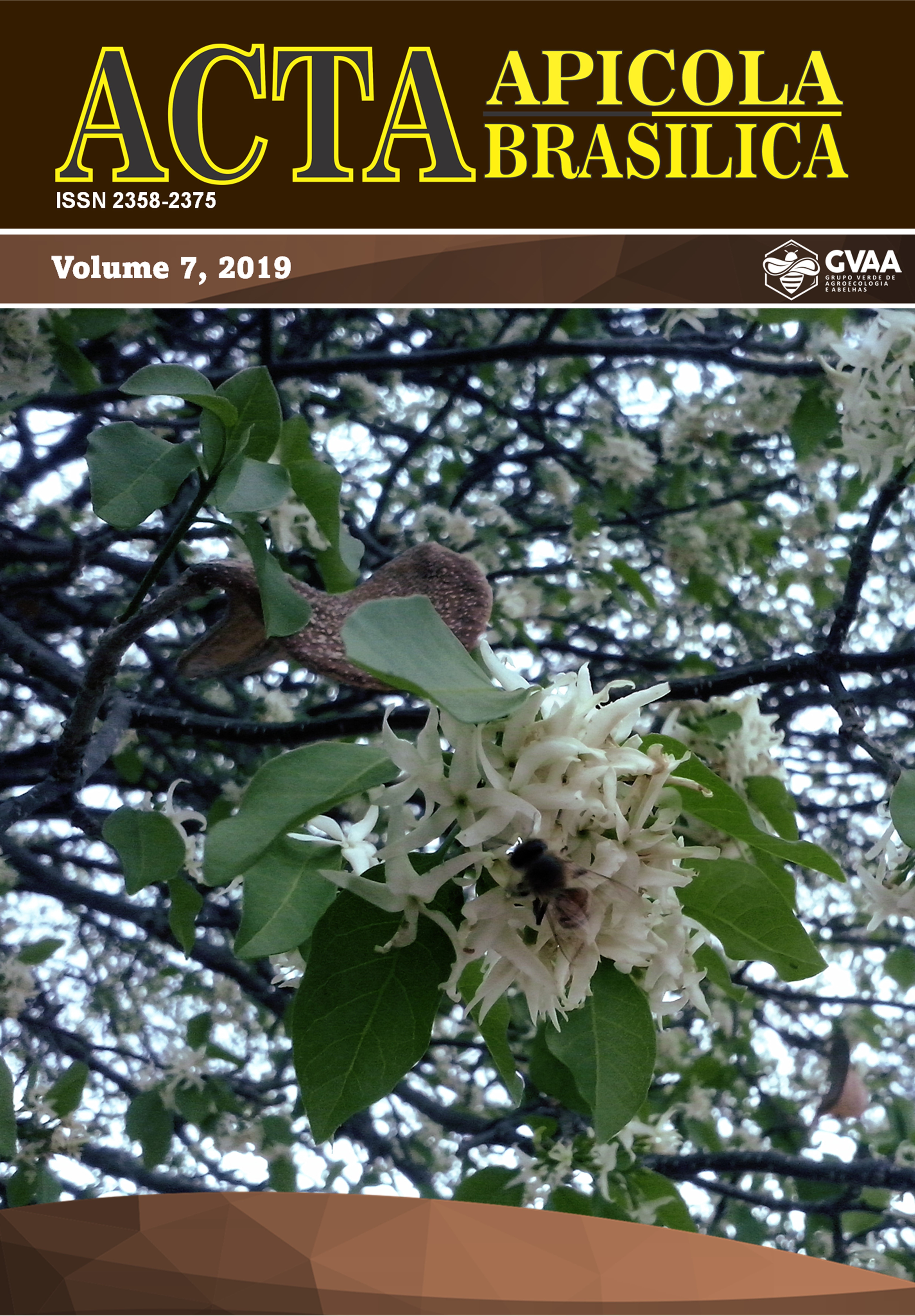Energy sources on the longevity of bees (Apis mellifera L.) in controlled conditions
DOI:
https://doi.org/10.18378/aab.v7i0.7545Keywords:
Beekeeping, Artificial feeding, Consumption, MortalityAbstract
Beekeeping is an activity that depends on several factors among them the environment. In times where the food for bees is scarce it is necessary to opt for artificial feeding, where it is necessary to know the foods that will be offered the bees. This research was aimed at evaluating the influence energy and protein sources on the longevity of worker bees (Apis mellifera L.) in vitro. The sources evaluated were the mixture of pollen (10%) and icing sugar (90%), only icing sugar (100%), a mixture of pollen (10%) and honey (90%) and icing sugar (90%) and honey (10%). Freshly-emerged bees were collected from honeycombs and placed in groups of 20 bees in wood cages, with controlled environment, where the due feeds were served and recorded the survey of the number of dead bees daily. The work was conducted in fully randomized experimental design, with four treatments and six repetitions. In the bee survival analysis it was noted that the feeding of the pollen mixture (10%) and sugar (90%) was the one that provided the best results in relation to the longevity of the bees, as opposed to feeding only sugar where it presented the lowest longevity index.
Downloads
References
ALMEIDA NETO, I. P., SILVA, R. A., SILVA, S. S., SOUSA, J. S., ANDRADE, A. B. A., Influência de essências na alimentação artificial energética na atratividade de Abelhas Apis mellifera. Revista Verde v. 10, n.3, p 47-52, 2015.
BARROS, D. C. B.; CAMILLI, M. P.; DANIEL D. MENDES, D. D.; ORSI, R. O., A importância das abelhas Apis mellifera L. e a influência da alimentação proteica (pólen) no desenvolvimento dos enxames e das crias. In: V Jornada Científica e Tecnológica da FATEC de Botucatu, 2016.
BETIOLI, J. V.; CHAUD-NETTO, J. Group effect on longevity of Africanized honeybee workers (Apis mellifera L.) mainteined without queen in laboratory conditions. Naturalia, v.26, p.265-275, 2001.
CAMPOS, J. P. T. Suplementação energéticas para abelhas africanizadas. 41 f. Trabalho de Conclusão de Curso. (Bacharelado em Zootecnia) – Universidade Federal de São João Del- Rei, 2015.
CREMONEZ, T. M.; JONG, D. Influência da nutrição sobre aspectos da fisiologia e nutrição de abelhas Apis mellifera. 2001. Universidade de São Paulo, Ribeirão Preto, 2001.
DIETZ, A. Nutrition of the adult honey bee. IN: Dadant & Sons (org.). The hive and the honey bee. Hamilton: Illions. p.125-156, 1975.
GOMEZ, S. A.; MOSCARDI, F.; SOSA GÓMEZ, D. R. Suscetibilidade de Spodoptera frugiperda a isolados geográficos de um vírus de poliedrose nuclear. Pesquisa Agropecuária Brasileira, v.34, p.1539 1544, 1999.
LIMA, C. B. S.; RIBEIRO, M. F.; GAMA, F. C.; SILVA, S. R. Preferências de abelhas mandaçaia (Melipona mandacaia) na alimentação artificial. Revista Magistra, v. 24, p. 228-233, 2012.
LIMA, M. V.; SILVA, V. T.; SOARES, K. O.; RODRIGUES, A. E. Características reprodutivas das colônias de abelhas Apis mellifera submetidas à alimentação artificial. Agropecuária Científica no Semiárido, v.11, n.4, p.97-104, 2015.
MARTINS, R. P., BARBEITOS, M. S. Adaptações de insetos a mudanças no ambiente: ecologia e evolução de diapausa. O Ecologia Brasiliensis, v. 8, p. 149-192, 2000.
MELO, I. L. P.; FREITAS, A. S.; BARTH, O. M. ALMEIDA-MURADIAN, L. B. Relação entre a composição nutricional e a origem floral de pólen apícola desidratado. Rev Inst Adolfo Lutz, v. 68, n.3, p.346-53, 2009.
PEREIRA, D. S.; PAIVA, C. S.; COELHO, W. A. C.; HOLANDA-NETO, J. P.; SILVA, A. F.; MARACAJÁ, P. B. Peso de rainhas virgens africanizadas produzidas em colônias submetidas a diferentes suplementações alimentares em Mossoró-RN, Brasil. ACTA Apicola Brasilica, v. 03, n.1, p.18-24, 2015.
PEREIRA, F. M.; FREITAS, B. M.; VIEIRA NETO, J. M.; LOPES, M. T. R.; BARBOSA, A. L.; CAMARGO, R. C. R. Desenvolvimento de colônias de abelhas com diferentes alimentos protéicos. Pesq. agropec. bras. v.41, n.1, p.1-7. 2006.
PEREIRA, F. M.; FREITAS, B. M.; VIEIRA NETO, J. M.; LOPES, M. T. R. BARBOSA, A. L.; CAMARGO, R. C. R.; RIBEIRO, V. Q.; ROCHA, R. S. Efeito tóxico de alimentos alternativos para abelhas Apis mellifera. Ciência Rural, v.37, n.2, p.533-538, 2007.
PINHEIRO, E. B.; MARACAJÁ, P. B.; MEQUITA, L. X.; SOTO-BRANCO, B.; OLIVEIRA FILHO, R. B. Efeito de diferentes alimentos sobre a longevidade de operárias de abelha jandaíra em ambiente controlado. Revista Verde, v.4, n.3, p. 50-56, 2009.
SHARMA, H. K.; GUPTA, J. K. Sensanal variation in color, weight and crude proteina content of pollen loads of hive bees. Indian Bee Journal, v. 58, n. 3, p. 125-128, 1996.
VIDAL, M. F. Efeitos da seca de 2012 nas exportações nordestinas de mel. Informe Rural ETENE, Banco do Nordeste do Brasil S.A.: Fortaleza, ano VIII, n 3, 2014.
Published
How to Cite
Issue
Section
License
Copyright (c) 2019 Rosilene Agra da Silva et al.

This work is licensed under a Creative Commons Attribution 4.0 International License.













